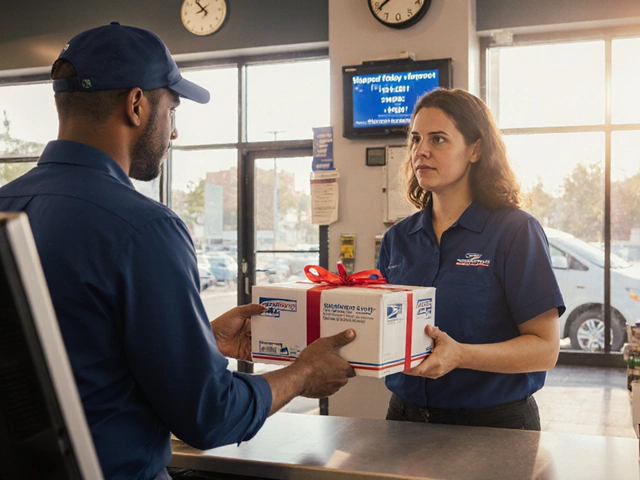Shipping precious items can often feel like you’re sending a piece of your heart out into the world. Will it arrive safely? That’s where delivery insurance steps in, offering a sigh of relief.
For those who frequently rely on UPS for their shipping needs, opting for insurance can seem like an important security measure. However, the question arises: is it truly worth the price you pay?
Let’s explore what UPS insurance really entails, and how you can make the best choice for your delivery needs. Whether you're considering shipping the latest tech gadget or a handmade art piece, this guide will provide valuable insights to help you navigate the sometimes tricky waters of shipping insurance.
- Understanding UPS Insurance Basics
- Cost vs. Coverage: What You Need to Know
- When UPS Insurance Makes Sense
- Comparing Alternatives to UPS Insurance
- Tips for Making an Informed Insurance Decision
Understanding UPS Insurance Basics
When we talk about UPS insurance, it's crucial to know that it's not your typical everyday insurance policy. Think of it as a safety net draped lovingly, yet firmly, around your precious cargo when it embarks on its journey across the highways, byways, and skies. This insurance gives you a sense of control, offering coverage for a range of unfortunate events such as loss or damage during transit. For many, the prospect of handing over something valuable—be it a family heirloom or critical business documents—to a shipper can be nerve-wracking, and having that insurance can be the salve to settle nerve-wracked souls.
When you purchase delivery insurance through UPS, you're essentially buying peace of mind up to a certain declared value. It's like giving a nod to the universe, saying, "I trust you, but let’s cover all bases just in case." For items valued at $100 or less, good news: UPS automatically provides coverage at no extra charge. Now, once we start talking about shipments exceeding $100 in value, that's when additional fees kick in, scaling up based on the declared value of your package. For every $100 of your package's worth beyond the initial included coverage, UPS offers additional protection for a nominal fee, a bit like slipping a cloak over your shipment for an extra layer of security.
It’s vital to understand that this insurance is particularly geared to cover the retail cost of your shipment. So while your vintage record collection or custom artwork isn't truly "irreplaceable," you'll be financially cushioned should the unexpected happen. However, ensure you’re prepared to prove the value of whatever you’re insuring. A carefully kept receipt or detailed appraisal can go a long way in ensuring the insurance payout matches your expectations should you need to make a claim.
According to a report from Shipware, the frequency of package loss or damage claims increased by 4% in the last year alone, highlighting why consumers are leaning into shipping insurance more than ever. Expediency and reliability are UPS's cornerstones, yet even industry giants face challenges beyond their control, like weather events or accidental mishandlings. Which raises the question: is the cost of shipping coverage worth the potential savings? A guarantee of coverage, given the unpredictability of shipping, might just be worth its weight, metaphorically speaking, in gold.
"While most packages arrive without a hitch, insurance offers a layer of security for peace of mind," says Lisa Williams, a logistics expert at Deliver Insights. "It’s not just about expecting the worst; it's about smart risk management and valuing what's important to you."
Cost vs. Coverage: What You Need to Know
When considering UPS insurance, understanding the balance between cost and coverage is essential for any shipper. The pricing structure of UPS insurance can be quite straightforward, but it's important to carefully weigh the benefits against the costs. Typically, UPS charges an extra fee for insurance coverage that increases with the declared value of your package. On average, the fee begins with a minimal cost per hundred dollars of declared value, and as the value increases, so does the rate. Deciding on the appropriate level of coverage requires you to accurately assess the value of your shipment and how much you're willing to pay to protect against potential damage or loss during transit.
A key point to consider is whether the cost of insurance aligns with the value of the items being shipped. For less valuable items, taking a risk without insurance may be acceptable, but for more expensive items, investing in insurance could be prudent. The most effective way to conceptualize this is by considering the likelihood of a loss occurring and how catastrophic losing the item would be. One common approach is to evaluate the replacement cost of your item and weigh it against the insurance premium. If the peace of mind offered by coverage outweighs the cost, it may be a worthy investment.
According to James Nevin, a longtime logistics analyst, "Insurance is only as valuable as the peace of mind it delivers, and those uncertain about their shipment's safety may find it a necessary expense."
However, it's essential to digest what UPS insurance actually covers. Typically, UPS insurance covers physical loss or damage to a package, but there are exceptions—such as acts of God, natural disasters, or improper packaging. It's crucial to thoroughly review the terms to understand precisely what circumstances are covered. With this knowledge, shippers can make informed decisions about their purchases. Moreover, examining alternatives or complimentary policies offered by other insurers or package delivery services can provide a more comprehensive view of all available options.
The Fine Print on Protection
Understanding the nuances in the insurance contract is equally important. As with any insurance policy, exclusions can play a pivotal role. Here, the devil is in the details. Certain valuables, such as antiques, jewelry, or items of extraordinary value, may not be covered to their full extent under standard UPS policies without special arrangements. This can affect a wide range of senders, from businesses shipping expensive electronics to individuals sending heirloom jewelry. Reading the fine print can reveal options to purchase additional coverage or specific conditions where the standard coverage would fall short.
Taking time to understand the terms and conditions of UPS insurance can potentially save headaches down the road. It's not just about the price you pay but the breadth of coverage you receive. These considerations allow shippers to tailor insurance purchases to meet their specific needs without overspending. A fully informed decision about coverage can mitigate risks effectively without breaking the bank.

When UPS Insurance Makes Sense
Choosing whether to insure your packages with UPS comes down to more than just peace of mind. It's about making smart, strategic financial decisions. Knowing the true value of what you’re shipping is crucial. If you’re transporting high-value items, such as electronics, jewelry, or antiques, investing in UPS insurance could save you a significant amount of distress and potential loss. Even items with sentimental value, like family heirlooms, might warrant the extra cost of coverage. This specialized insurance provides an extra layer of protection, ensuring that in the unfortunate event your package is lost, damaged, or delayed, you're covered.
There are certain circumstances where UPS insurance is not only wise but essential. Businesses that regularly send pricey or irreplaceable products should consider incorporating delivery insurance as a part of their shipping strategy. Consistent losses can dent their reputation and profit margins. For example, studies show that approximately 5% to 10% of packages experience some form of mishap during transit. This statistic, though seemingly small, can accumulate significantly over a long stretch of time, particularly for small businesses that depend on flawless transaction records. Insuring these packages can mean the difference between surviving a loss and succumbing to it.
"Shipping insurance isn't just about replacing a lost item; it's about securing your business's reliability," says Emma Clarkson, a logistics expert with more than two decades of experience in the field. "Without it, you're opening up pathways to financial and reputational harm."
Personal shipments also benefit from UPS insurance. If you're sending a rare, collectible item via a marketplace sale, insurance provides assurance to both buyer and seller. In private sales, where trust is hard to establish, having insurance can immensely boost confidence in the transaction. It acts as a bridge, making the sender and recipient more comfortable and at ease with the exchange, which is crucial for transactions that have a high emotional or intricate financial involvement.
Consider another scenario where you’re sending gifts during the holiday rush. More packages in transit mean more chances of mishaps; it's a time of year when insurance becomes a wise decision. Insurance also covers circumstances beyond damage or loss—like unexpected delays due to weather or logistical issues. If you were to send a crucial document that simply cannot be late, insurance buffers some of the stress by potentially cushioning against the cost implications of such delays. Shipping coverage thus functions as a powerful ally in mitigating both financial and temporal risk, ensuring your deliveries, however critical, maintain their expected course.
Comparing Alternatives to UPS Insurance
When it comes to shipping valuable items, you want to ensure that they are safeguarded against the unexpected. So, what happens if you wish to explore options beyond UPS insurance? Fortunately, there are various alternatives available that might better suit your needs and offer distinct advantages. One such option includes dedicated third-party insurance companies specifically designed for shipping protection. These companies, like Shipsurance and U-PIC, often provide comprehensive coverage options tailor-made for diverse shipping needs. Unlike standard carrier insurance, third-party providers may deliver at a lower cost and with enhanced customer service, which makes them a competitive choice.
Many businesses and regular shippers find third-party insurers to be a more flexible option. These alternatives often allow the customization of terms and coverage limits, which can be a lifesaver for senders who frequently ship high-value items. They typically offer full value reimbursement, covering the cost of repair or replacement, depending on what's included in the policy. Additionally, some of these providers work seamlessly with major carriers like UPS, USPS, and FedEx, which simplifies the process and integrates smoothly with existing logistics practices.
According to industry experts, leveraging third-party insurance not only saves costs but also improves the claims process. "Third-party insurers usually settle claims much faster compared to traditional carriers," mentions Jane Davis, a logistics consultant at Global Courier Solutions. "They’re more responsive because they specialize solely in this service."
Moreover, an interesting alternative available in the market is the insurance coverage offered by some credit card companies. If you pay for shipping with certain credit cards, they might offer complimentary shipping insurance up to a specified amount. This little-known benefit can be a surprisingly effective way to get coverage without additional cost. Review your credit card benefits and contact your provider to determine if this option could be tapped into, as it varies considerably between companies.
When analyzing the broader picture, another factor to consider is self-insurance. Companies that frequently ship a vast amount of goods sometimes choose to self-insure. This option is typically more suitable for larger businesses with the financial capacity to absorb potential losses. It requires a comprehensive risk management strategy and strong internal processes but can lead to considerable savings in the long run. There's a neat aspect to self-insurance, where the saved funds from not paying premiums can be invested directly back into the company or held in reserve for losses.
Lastly, it’s important to acknowledge the role of packaging in the context of insurance. The best insurance policy is prevention, and investing in high-quality protective materials can reduce the risk of damage and bolster confidence in the shipping process. When doing a head-to-head comparison, alternatives to UPS insurance often stack up well in terms of adaptability and potential cost-effectiveness. However, as with any decision, understanding the nature of your shipments and risk tolerance is key before selecting the right insurance mode that aligns with your goals.

Tips for Making an Informed Insurance Decision
Deciding whether to insure your shipment with UPS insurance involves weighing several considerations that affect both your peace of mind and wallet. Firstly, evaluate the value of your shipments. If the items are valuable both financially and sentimentally, insurance provides a layer of protection that is often worth the premium. Consider the cost of replacing the item if it gets lost or damaged. For expensive shipments, insurance cost is typically just a fraction of replacement value, making it a savvy investment.
Next, assess the actual risks involved. The destination of your package plays a role; locations with known delivery challenges might warrant additional protection. Also, frequency matters—if you ship often, you may want to look at holding an annual insurance policy or even alternative options for frequent shippers. Package protection becomes crucial for those regularly dispatching valuable goods. Your decision should align with the shipping realities you face.
Additionally, compare UPS insurance to offerings from other carriers and third-party insurers. Often, third-party insurers provide competitive rates with extensive coverage, presenting a viable alternative. Research how claims are handled, as ease of processing can be a deal-breaker. According to a study by ShipWatch, using consolidated third-party insurance can lead to savings of up to 40%, so shop around and understand each policy’s specifics.
“You don’t buy insurance because you’re going to have a loss but because no one knows when or if the loss will occur.” — From financial expert Suze Orman
Finally, always read the fine print. Coverage specifics matter, including what’s covered under "Full Value Protection" compared to basic policies. Each shipping coverage plan outlines exclusions and specifics on maximum pay-outs, and certain collectibles or high-value items might not get full protection. Know these details ahead of time.
Practical Steps for Decision-Making
- Calculate Package Value: Weigh the cost against the potential return from insurance.
- Understand Destination Risks: Consider location logistics and risks.
- Explore Alternatives: Investigate third-party insurance providers, look into consolidated options.
- Check Coverage Details: Scrutinize policy specifics, coverage limits, and exclusions.
- Read Reviews and Recommendations: Community feedback on claims and customer experience can guide you.





